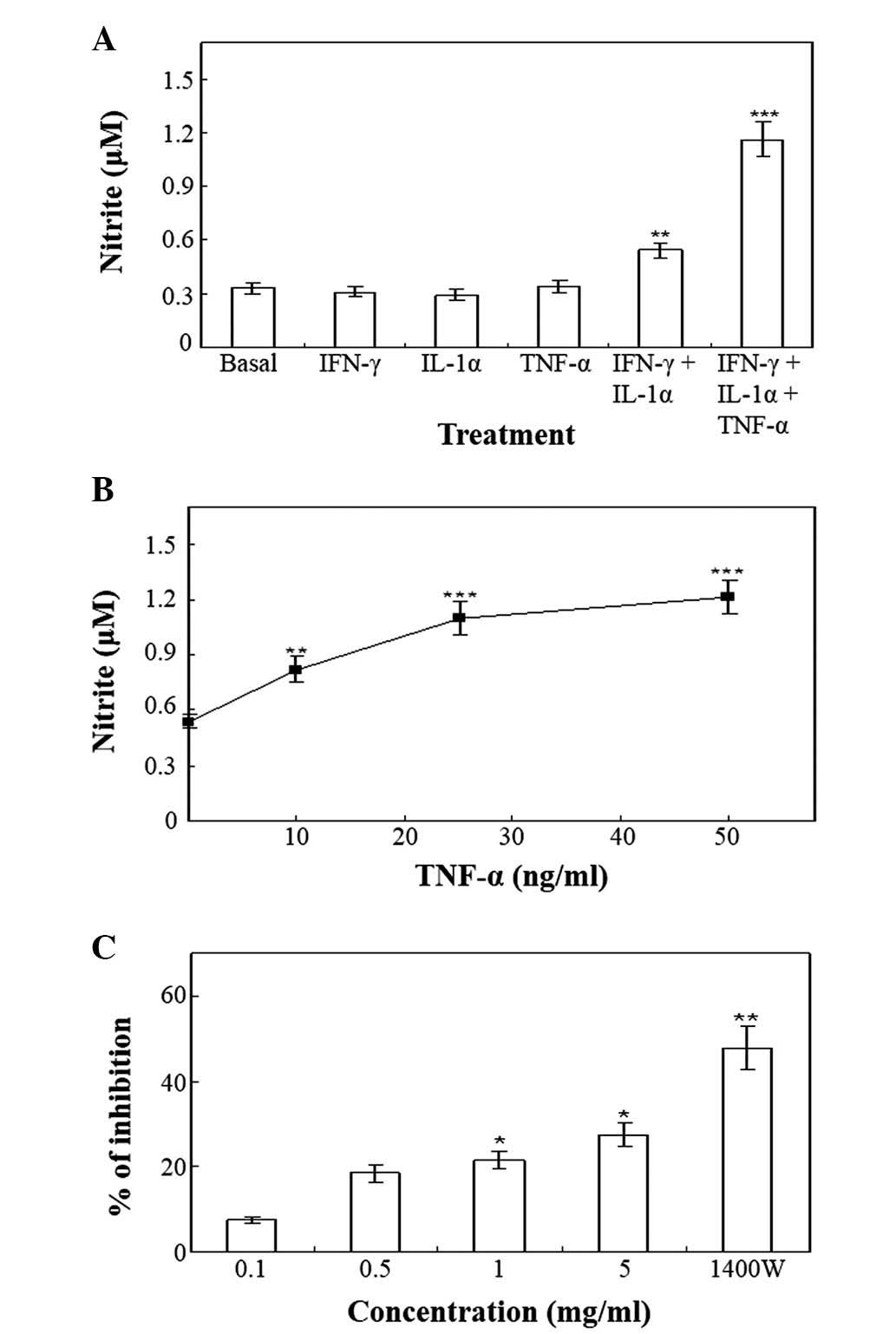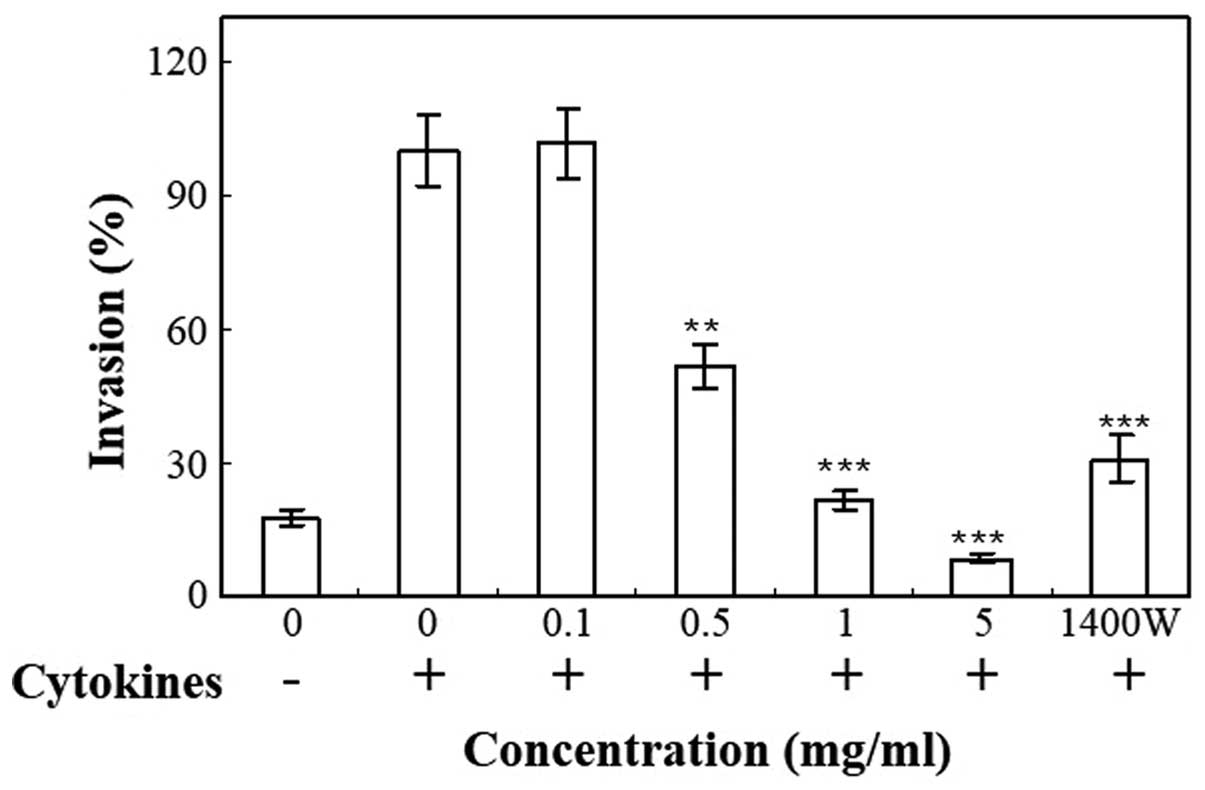|
1
|
Choudhari SK, Chaudhary M, Bagde S,
Gadbail AR and Joshi V: Nitric oxide and cancer: a review. World J
Surg Oncol. 11:1182013. View Article : Google Scholar : PubMed/NCBI
|
|
2
|
Förstermann U and Sessa WC: Nitric oxide
synthases: regulation and function. Eur Heart J. 33:829–837.
837a–837d. 2012. View Article : Google Scholar :
|
|
3
|
Tanese K, Grimm EA and Ekmekcioglu S: The
role of melanoma tumor-derived nitric oxide in the tumor
inflammatory microenvironment: its impact on the chemokine
expression profile, including suppression of CXCL10. Int J Cancer.
131:891–901. 2012. View Article : Google Scholar :
|
|
4
|
Raina K, Agarwal C and Agarwal R: Effect
of silibinin in human colorectal cancer cells: targeting the
activation of NF-kappaB signaling. Mol Carcinog. 52:195–206. 2013.
View Article : Google Scholar :
|
|
5
|
Robert J: Biology of cancer metastasis.
Bull Cancer. 100:333–342. 2013.(In French). PubMed/NCBI
|
|
6
|
Khokha R, Murthy A and Weiss A:
Metalloproteinases and their natural inhibitors in inflammation and
immunity. Nat Rev Immunol. 13:649–665. 2013. View Article : Google Scholar : PubMed/NCBI
|
|
7
|
Chaudhary AK, Pandya S, Ghosh K and
Nadkarni A: Matrix metalloproteinase and its drug targets therapy
in solid and hematological malignancies: an overview. Mutat Res.
753:7–23. 2013. View Article : Google Scholar : PubMed/NCBI
|
|
8
|
Langenskiöld M, Ivarsson ML, Holmdahl L,
et al: Intestinal mucosal MMP-1 - a prognostic factor in colon
cancer. Scand J Gastroenterol. 48:563–569. 2013. View Article : Google Scholar : PubMed/NCBI
|
|
9
|
Haranaka K, Satomi N, Sakurai A, et al:
Antitumor activities and tumor necrosis factor producibility of
traditional Chinese medicines and crude drugs. Cancer Immunol
Immunother. 20:1–5. 1985. View Article : Google Scholar : PubMed/NCBI
|
|
10
|
Onishi Y, Yamaura T, Tauchi K, et al:
Expression of the anti-metastatic effect induced by Juzen-taiho-to
is based on the content of Shimotsu-to constituents. Biol Pharm
Bull. 21:761–765. 1998. View Article : Google Scholar : PubMed/NCBI
|
|
11
|
Kwak DH, Kim JK, Kim JY, et al:
Anti-angiogenic activities of Cnidium officinale Makino and Tabanus
bovinus. J Ethnopharmacol. 81:373–379. 2002. View Article : Google Scholar : PubMed/NCBI
|
|
12
|
Garvey EP, Oplinger JA, Furfine ES, et al:
1400W is a slow, tight binding, and highly selective inhibitor of
inducible nitric-oxide synthase in vitro and in vivo. J Biol Chem.
272:4959–4963. 1997. View Article : Google Scholar : PubMed/NCBI
|
|
13
|
Menchén LA, Colón AL, Moro MA, et al:
N-(3-(aminomethyl) benzyl)acetamidine, an inducible nitric oxide
synthase inhibitor, decreases colonic inflammation induced by
trinitrobenzene sulphonic acid in rats. Life Sci. 69:479–791. 2001.
View Article : Google Scholar
|
|
14
|
Mertas A, Duliban H, Szliszka E, et al:
N-[3-(aminomethyl)benzyl]acetamidine (1400W) as a potential
immunomodulatory agent. Oxid Med Cell Longev. 2014:4912142014.
View Article : Google Scholar
|
|
15
|
Bernard WS and Christopher PW: World
Cancer Report 2014. International Agency for Research on Cancer,
World Health Organization; Lyon, France: 2014
|
|
16
|
Center MM, Jemal A, Smith RA and Ward E:
Worldwide variations in colorectal cancer. CA Cancer J Clin.
59:366–378. 2009. View Article : Google Scholar : PubMed/NCBI
|
|
17
|
Fleming M, Ravula S, Tatishchev SF and
Wang HL: Colorectal carcinoma: Pathologic aspects. J Gastrointest
Oncol. 3:153–173. 2012.PubMed/NCBI
|
|
18
|
Kim M, Li YX, Dewapriya P, et al:
Floridoside suppresses pro-inflammatory responses by blocking MAPK
signaling in activated microglia. BMB Rep. 46:398–403. 2013.
View Article : Google Scholar : PubMed/NCBI
|
|
19
|
Green LC, Wagner DA, Glogowski J, et al:
Analysis of nitrate, nitrite, and [15N]nitrate in biological
fluids. Anal Biochem. 126:131–138. 1982. View Article : Google Scholar : PubMed/NCBI
|
|
20
|
Hwang BM, Chae HS, Jeong YJ, et al:
Protein tyrosine phosphatase controls breast cancer invasion
through the expression of matrix metalloproteinase-9. BMB Rep.
46:533–538. 2013. View Article : Google Scholar : PubMed/NCBI
|
|
21
|
Thomsen LL and Miles DW: Role of nitric
oxide in tumour progression: lessons from human tumours. Cancer
Metastasis Rev. 17:107–118. 1998. View Article : Google Scholar : PubMed/NCBI
|
|
22
|
Oktem G, Bilir A, Selvi N, et al:
Chemotherapy influences inducible nitric oxide synthase (iNOS) and
endothelial nitric oxide synthase (eNOS) activity on 3D breast
cancer cell line. Oncol Res. 16:195–203. 2006.PubMed/NCBI
|
|
23
|
Broholm H, Rubin I, Kruse A, et al: Nitric
oxide synthase expression and enzymatic activity in human brain
tumors. Clin Neuropathol. 22:273–281. 2003.PubMed/NCBI
|
|
24
|
Ramasamy K, Dwyer-Nield LD, Serkova NJ, et
al: Silibinin prevents lung tumorigenesis in wild-type but not in
iNOS−/− mice: potential of real-time micro-CT in lung cancer
chemoprevention studies. Clin Cancer Res. 17:753–761. 2011.
View Article : Google Scholar :
|
|
25
|
Babu BR and Griffith OW: Design of
isoform-selective inhibitors of nitric oxide synthase. Curr Opin
Chem Biol. 2:491–500. 1998. View Article : Google Scholar : PubMed/NCBI
|
|
26
|
Bauvois B: New facets of matrix
metalloproteinases MMP-2 and MMP-9 as cell surface transducers:
outside-in signaling and relationship to tumor progression. Biochim
Biophys Acta. 1825:29–36. 2012.
|


















